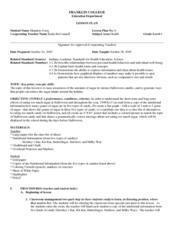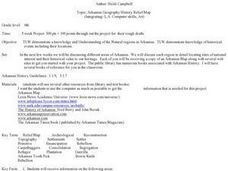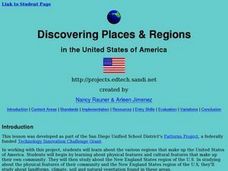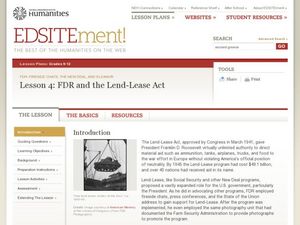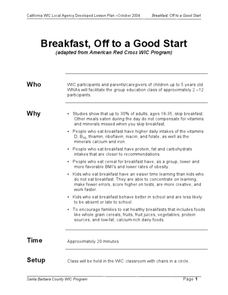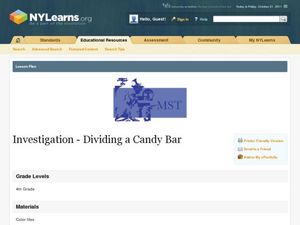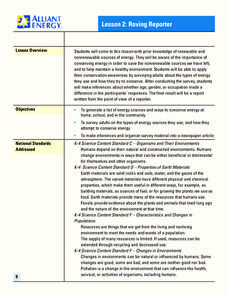Curated OER
A Natural Connection to the Azores
Students use primary sources to examine whaling voyages, biology, and geography. In this geography lesson, students analyze ship logs and plot locations of animals and determine routes using latitude and longitude.
Curated OER
Remembering World War II
Students read about America's participation in World War II. They study images, timelines, and other primary source documents.
Curated OER
The Challenge to Deliver Insulin
Students investigate these fundamental chemical and cellular processes. They recognize the long-term danger that comes from a diet of fast food, chips, and soda, realize that avoiding diabetes is their responsibility, and establish...
Curated OER
Halloween Candy/ Sugar Content
Fourth graders examine the amount of sugar contained in Halloween candy by looking at nutritional labels from candy bars. They figure out ways to encourage people to reduce the amount of sugar they eat at this holiday. They look at the...
Curated OER
Arkansas Geography/History Relief Map
Sixth graders research a number of sources including the Internet to find information about the regions of Arkansas while locating sites of national historic interest. They located sites on maps while working at assigned websites. They...
Curated OER
Debating for Land
Students research pertinent information based on historical facts and is supported by quotations from primary sources in order to prepare for a class debate about land ownership in the 19th century.
Curated OER
Discovering Places & Regions
Fifth graders research physical and cultural features of a place. They practice skills in gathering information from various sources, using tools such as graphic organizers, word processing, multimedia, and use of the Internet.
Curated OER
FDR and the Lend-Lease Act
Young scholars analyze primary source documents and photographs to analyze the implications of the Lend-Lease Program. In this research lesson plan, students read and discuss letters and speeches related to the Lend-Lease Act, evaluate...
Curated OER
Fighting Disease
Seventh graders explore the concept of medical intervention in African nations. In this geography lesson, 7th graders research primary and secondary sources in search of information regarding Guinea worm disease. Students use their...
Curated OER
Build an Anchialine Pond
Students explore biology by conducting a nature experiment. In this pond examination lesson, students utilize recycled materials, play-doh and water to recreate a pond and its inhabitants. Students identify the different elements within...
Curated OER
Chinese Shadow Puppets
Students explore Chinese culture by performing a shadow puppet play. They create the puppets, develop a script, and rehearse and perform a play which illustrates an understanding of Chinese stories and traditions.
Curated OER
Scenario Introductory Menu Exercise
Seventh graders engage in a lesson plan that investigates the sources of Food Borne Illness. The practices of prevention are covered in the lesson plan. Various foods are looked at for the nutritional value and evaluated for the...
Curated OER
Breakfast, Off to a Good Start
Students discover the benefits of eating a healthy breakfast. In this adult health lesson plan, students compare the characteristics of breakfast eaters and nonbreakfast eaters. They examine cereals for their fiber and sugar content.
Curated OER
Debris Dilemmas
Students examine debris, what it is, where it comes from and where they go. In this debris lesson students view a video, answer questions and discuss what they learned.
Curated OER
Maintaining Plant Genebanks
Students examine the use, costs, and the need for plant gene banks. The rationale for gaining ownership over scientific information and the implications of the developing nations' reliance on biotechnology is explored in this...
Curated OER
All Hands on Deck: A Harbor Education Program
Pupils build a model of an estuary. In this wetland instructional activity, students build a model estuary with a paint tray and modeling clay. They use the model to illustrate the impact of non-point pollution on the watershed.
Curated OER
Oregon Trail Cooking
Learners compare differences between cooked and fresh greens. They realize how simplicity of recipe makes for easy travel on the Oregon Trail.
Curated OER
Dividing a Candy Bar
Fourth graders explore number values by utilizing a candy bar in class. In this fraction instructional activity, 4th graders divide pizza and candy amongst each other in order to identify parts of a whole and fractions. Students answer...
Curated OER
Fats
Students are introduced to the characteristics of fats and their function in the body. In groups, they make a reduced fat recipe of chicken fingers and discuss other ways to reduce fat in their diet. To end the lesson, they identify...
Curated OER
Milk: A Practical Application
Students examine the impact of the physical and chemical properties of milk and its use as an important food.
Curated OER
Grinding corn in Swaziland
Learners participate in grinding corn, a major part of food preparation in rural Swaziland.
Curated OER
Roving Reporter
Learners write a report about energy use. In this conservation lesson, students interview adults about their use of renewable and nonrenewable energy. Learners synthesize this information and write a report from the point of view of a...
Curated OER
Ocean Currents
Students discover the geography of Earth by analyzing water currents. In this oceanography lesson, students create visual references on a map of the globe where and why major ocean currents are moving water. Students conduct a water...
Curated OER
Water Issues on Puerto Rico and Oahu: A Comparison of Two Islands
Fifth graders explore how the tow islands receive and use fresh water. They also address some of the threats to the fresh water supply on each island. Students explore the lesson objectives through water cycle models and experiments.





